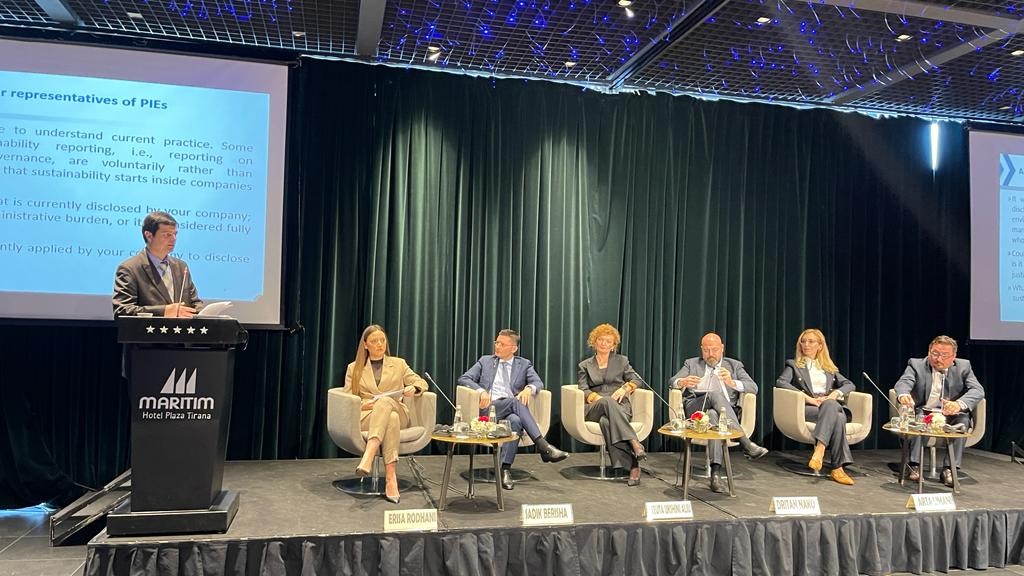
Antea Cement publishes the 2021 Integrated Annual Report
October 3, 2022
Antea Cement introduce the two new types of cement in our domestic market
February 9, 2023ANTEA Cement at the Conference “Strengthening corporate governance in Albania and Kosovo: Sustainability reporting and increased role of the audit committees”

Foreign investors are increasingly calling for high-quality, reliable and comparable financial reporting by companies on social, environmental, climate or governance matters. The World Bank organized a Conference with the support of the EU on “Strengthening corporate governance in Albania and Kosovo: Sustainability reporting and the increased role of the audit committees”. As one of the panelists at the Conference, Antea Cement had the opportunity to contribute to the discussion on the importance and challenges of sustainability reporting in the region, particularly in the context of the adoption of the European Sustainability Reporting Standards.
In the capacity of the only Albanian company that prepares and issues Integrated Reports regarding the company’s performance and achievements on Environment, Social and Governance Areas (#ESGs), ANTEA used the opportunity to share its views on sustainability and its best practices with the participants in the Conference. Furthermore, an invitation was made for any possible future cooperation that would contribute to the adaptation of Albanian companies to the reporting standards.
The readiness and commitment expressed, were highly appreciated by the participants who interacted with quite a constructive approach. During the discourse, ANTEA highlighted that Cement Production Units are complex installations that engage various elements in the process of carrying out the activity of producing and trading cement. It is about technology, people, and environment.
Everything is involved and affected mutually in one way or another and as such everything needs to co-exist in harmony. That requires a deep and truthful determination on the business side to do consistently what is right and if what’s done is not done with respect for the health, environment, and sensitivity for the future generations, it is simply not the right thing to do. Therefore, sustainability comes as a fundamental need and prerequisite to a successful cement production and trading business.
It is crucial for producers to have knowledge of their production process, products, and potential impact on the environment, society, and economy. Customers, employees, suppliers, communities, governments, and other stakeholders also play a vital role in ensuring that the right thing is being done. Ultimately, achieving sustainability requires collaboration and shared responsibility among all stakeholders. By working together, we can create a more sustainable and equitable future for all.
It is true that producing comprehensive reporting on the non-financial performance of a business requires significant investment of time, people, and money. However, ANTEA believes that this investment is worth it because understanding and monitoring a business’s non-financial performance is critical for ensuring its long-term success and sustainability. By providing transparency into a business’s social, environmental, and governance practices, non-financial reporting can help build trust and credibility with these stakeholders, as well as identify areas for improvement.
For ANTEA it is the 8th year now issuing on annual basis and on a standalone basis, in addition to TITAN Group’s report, the Integrated Report on its performance and achievements in Environmental, Social and Governance Areas (ESGs). The report is certified by Independent Auditors on a limited assurance level for the presentation of the Materiality Assessment process and outcomes and the disclosure of sustainability performance. We meet the requirements of the UN Global Compact Communication on Progress for the Criterial Advanced Level.
We comply with TITAN Sustainability Reporting Standards in reference to the implementation of the principles of the International Integrated Reporting Council, UN Global Compact Communication on Progress Guidelines and Global Cement and Concrete Association Guidelines. Lastly, we have integrated into our approach the guidance of the UN Conference on Trade and Development to connect its sustainability Reporting with targets for the SDGs.
